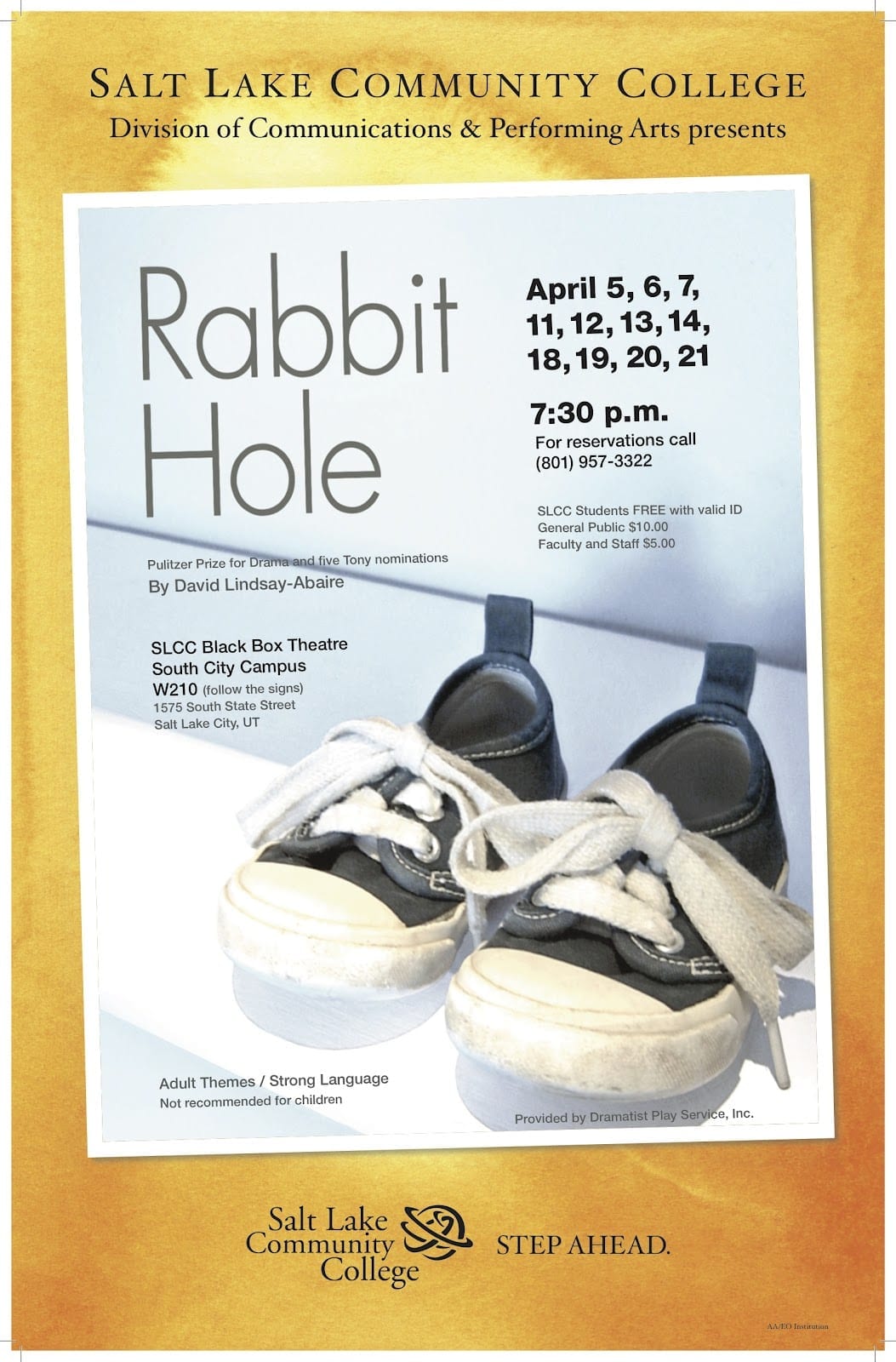SALT LAKE CITY — Every so often a show comes along that sticks with you and even changes you as you continue to think back on it. Rabbit Hole was such a show for me, so much so that all I can think while writing this review is: GO SEE THIS PLAY! If you want to experience a refreshing, real, heart-wrenching show that somehow mends at the same time, see one of Rabbit Hole’s final performances. This is one not to miss, though because of strong language and emotionally mature material, it is an adult show.

Rabbit Hole revolves around a married couple dealing with the unexpected loss of their child. It is impeccably written by David Lindsay-Abaire—as affirmed by the fact that it won the 2007 Pulitzer Prize for Drama. Often the problem with this caliber of show is that the actors do not measure up to the material, leaving what could be a phenomenal piece merely flat and unsatisfying. Happily, director Neil Vanderpool and the five onstage actors at Salt Lake Community College’s Black Box Theatre pulled it off splendidly.
Though each actor excelled, the play would have failed miserably without a strong Becca, the female protagonist and heart of the play. Susan Barry nailed the part of Becca. She was so true-to-life that I felt within the first scene that this was a true story—Becca’s story—and I was fully engrossed in where her story would lead. The progression of the character is strong, thanks to the writing, but it is brilliantly acted by Barry. She ranges from ironic and vulnerable to outraged to deflated to scared to hopeful, all within the play’s short two-hour duration.
Andrew W. Johnson’s portrayal of the show’s male protagonist, Becca’s husband Howie, stood up well to Barry’s Becca. Though I have to admit that the first time Howie’s character appeared on stage, I wasn’t sure about him; he seemed a little too flat, too simple and sweet next to Barry’s complex Becca. Yet, as the play progressed, so did my appreciation for the actor Johnson. Like Becca, the role of Howie is one with so many levels that it requires a great deal of range in an actor to portray it well. Johnson’s strongest scene was one in which Howie reaches his “limit” and explodes at Becca, complete with throwing things (no one was harmed, I promise). In this scene, Johnson could have fallen into the trap of merely yelling and freaking out in a too over-the-top, generic way. Johnson instead expresses vulnerability, pain, even desperation in his angry explosion. His portrayal only got better from there to the emotional and captivating end.
The supporting cast, Sahna Foley as Becca’s sister Izzy, Kim Page as Becca’s mom Nat, and Austin Grant as the troubled teen Jason, each held their own next to the two incredibly strong leads. Izzy (Foley) was the comedic relief and, from a playwright’s perspective, the catalyst that often brought hidden emotions to the surface through her lack of tact and in-your-face personality. Becca’s mom, Nat (Page), also provided some comedic relief, and she had some nice, emotionally intense moments particularly with Becca. But Austin Grant was the biggest surprise in the role of Jason. Grant’s scenes are so charged that a lesser actor would have found it difficult not to overact. Yet Grant portrayed Jason impeccably, with emotional honesty that was deeply touching (and yes, made me cry).
If you take my advice and catch this production, be ye warned: don’t come hungry (several scenes involve characters eating delicious sounding and looking desserts) and bring some tissues (I cried several times, as did my—ahem, sorry to out you honey—husband, who is not normally a heavy crier). Lastly, be prepared to embark on a cathartic, emotional journey with the characters in the play, and come out at the end of the production impacted because of it.
[box type=”shadow”] Rabbit Hole is playing at the Black Box Theatrein room W 210 of Salt Lake Community College South City Campus (1575 South State Street, Salt Lake City). Performances are nightly through April 21 at 7:30 p.m. Tickets are $10. For more information or to purchase tickets, call 801-957-3322. Because of adult themes and some strong language, this play is not recommended for children.[/box]
